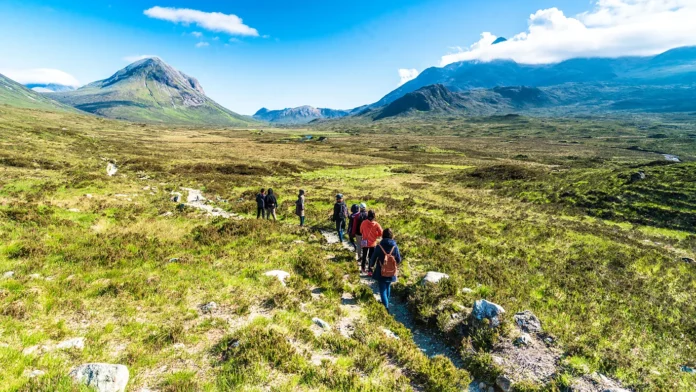They combine outdoor pursuits and mental health support for anyone who wants to improve their wellbeing, with or without a diagnosis.
At the top of a hill in England’s Peak District, life coach Zaidha Roscoe leads our group in an exercise to ground us in the present moment and find a sense of calm. “Focus on five things you can see, four you can touch, three you can hear, two you can smell and one you can taste,” she says. I notice cheery-neon hiking clothes against a cornflower-blue sky. Brush my fingers along the feathery grass. Tune in to a duet of chirping birds. Smell the crisp autumn air. And bite into nutty trail mix.
It’s the first of several mindfulness and nature connection activities we will do on this six-mile hike through Chatsworth Estate with Mind Over Mountains. The organisation hosts free wellbeing walks and low-cost weekend retreats led by mountain guides and qualified counsellors or coaches at national parks and Areas of Outstanding Natural Beauty across the UK. It’s one of a few organisations – including Blackdog Outdoors in the UK and Hiking My Feelings in the US – that combine outdoor pursuits and mental health support for anyone who wants to improve their wellbeing, with or without a diagnosis.
These organisations fill a canyon-sized gap in the outdoor and wellness spaces. Half of the world’s population will develop a mental health disorder in their lifetime. But while many places offer self-care activities such as yoga or forest bathing, these programmes rarely foster an atmosphere that encourages confiding to your instructor about your depression or chatting with fellow participants about grief. So, many people may feel isolated and unsupported in these settings.

Organisations like Mind Over Mountains create a space where discussions about emotions and difficulties are welcome. At our first stop on the walk, Rob Kenning, a member of the wellness team, tells our group, “Today, I’ve brought confident leader Rob, but there’s also a more vulnerable Rob that might be more difficult for me to bring because it challenges the more masculine side of me. I invite you all to bring as much of yourself as you would like to bring – physically, mentally, emotionally. You know how much of yourself it’s safe to bring.”
We follow the trail through a woodland and emerge at a 16th-Century hunting tower. Kenning invites us to share how we’re feeling now compared to when we started. Three participants admit they nearly cancelled because they were nervous about meeting new people, or because this place reminds them of outings with a loved one who recently died. But they’re all glad they mustered the courage to come.
I thought the mood on a mental health walk might be heavy but the conversation is convivial, open and supportive. As we ramble through a beech forest and lunch by a lake, we delight in photographing red and purple mushrooms and feeling the fuzzy moss on gnarled trees. If someone needs a private word with Roscoe or Kenning about issues they’re dealing with, they hang back a bit or walk to the side, and the rest of us give them time and space. It’s like a casually choreographed dance of compassion and care.
Several participants and guides tell me that strolling side-by-side in nature makes it easier to share their struggles or delve into deep discussions than when they’re indoors, staring into the eyes of a family member or a psychotherapist. “Being in nature relaxed me and helped me open up,” says Matt Heaton, who participated in a Mind Over Mountains retreat in 2022. “It just felt free because it’s such a beautiful place. And there were a couple of moments where I really felt connected with nature and the world.”








